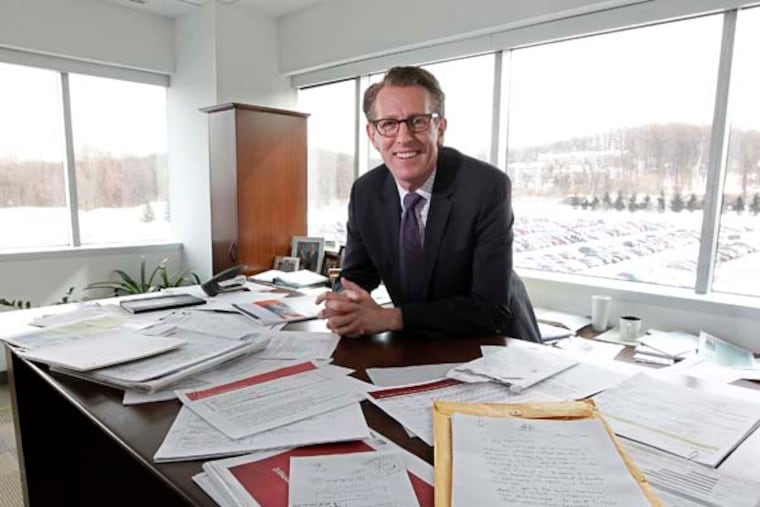PhillyDeals: Assets grow, employment slows at Vanguard
For a view of the "jobless recovery" - there are still fewer Americans employed today than in 2008, despite rising business profits and share prices - take a look at what has changed at Vanguard Group's Chester County campus. And what hasn't.

For a view of the "jobless recovery" - there are still fewer Americans employed today than in 2008, despite rising business profits and share prices - take a look at what has changed at Vanguard Group's Chester County campus. And what hasn't.
Vanguard assets have tripled, to nearly $3 trillion, since the stock market bottomed out five years ago. Its popular index portfolios, targeted-date retirement funds, and other products now account for nearly one-fifth of the U.S. mutual fund industry.
But employment at Vanguard's Malvern headquarters complex in western Tredyffrin Township and other local offices has grown only slowly, from about 9,300 to 9,800. Hiring has also been moderate at its smaller Phoenix and Charlotte centers. Some divisions now have fewer employees than in the past.
That wasn't the plan. Way back in 1999, Vanguard proposed a second multimillion-square-foot office center, at Happy Days Farm just off the Pennsylvania Turnpike exit in Lionville, Uwchlan Township. Local officials expected it would eventually hold 10,000 additional workers, more than doubling Vanguard's employment. The state of Pennsylvania said it was ready to grant up to $55.5 million in aid if Vanguard met its hiring goals.
"It was a wild time," recalled Michael Bray, Vanguard's head of corporate real estate and facilities. "Our headcounts were exploding."
But Happy Days hasn't been needed, and the state didn't have to provide any grants. Vanguard has kept hiring software managers, bond traders, 401(k) plan salespeople, and other specialists and bosses. But it has cut back on the platoons of young, hourly "crewmembers" who answered phone calls from investors.
"We don't have a goal of having fewer people at Vanguard," said Chris McIsaac, boss at Vanguard's Institutional Investor Group, which employs 2,600, down from 3,100 five years ago. "But if we can do more with the same number of people, that's a good thing for our clients."
Vanguard says it passes its lower expenses to customers by cutting fees.
"This has really been about technology and the Web," says Glenn Reed, Vanguard managing director for strategy and finance.
Vanguard was a phone-based company that didn't build retail offices (except a lone Philadelphia site, closed after founder John Bogle retired).
"We have more contacts between mobile devices," Reed said, than from old-fashioned call-ins. "You can transact on your phone. We have the capability to take a check, endorse the check, take a picture, and send it in and purchase fund shares."
"The Internet became more than just a content engine," Bray said. "It dramatically reduced the calls coming through. We came to the realization we didn't need to develop another two million square feet.
"You see this all over corporate America, the shrinking office footprint."
As office demand has fallen, Vanguard has negotiated lower taxes, based on the reduced value investors are now willing to pay for suburban office space. Assessments for Vanguard's buildings (named for the ships of Bogle's hero, Britain's Napoleonic-era Admiral Horatio Nelson) were cut in 2013 to $51 million from $69 million (though the nearby data center's assessment rose to $26 million, from $17 million.)
The result was to reduce Vanguard's net payments to the Tredyffrin/Easttown School District, where Vanguard is the largest taxpayer, and other local governments.
Vanguard isn't standing still. The company paid $40 million in 2013 for the vacant Wyeth drug complex across the old Trenton Cutoff rail line from its main campus. Vanguard is moving 1,800 people from the Institutional Investment division into the space. Wyeth had employed 1,300 worked there.
Vanguard has turned the old data center on the property into one of its backup power installations.
Workers were moved to the Wyeth site from Liberty Property Trust's Chesterfield complex north of Swedesford Road, which Vanguard vacated. Vanguard is also letting leases run out at 151 Warner Road in eastern Tredyffrin.
Across Route 29, Vanguard plans a 200,000-square-foot information-technology center. Vanguard architect Bradley Lambertsen, whose former firm RMJM Hillier developed Vanguard's original campus in the 1990s, says landlord Liberty Property Trust has agreed to a wide custom floorplan that will allow teams of software engineers and app developers plenty of space.
Vanguard has also developed a higher-end complex for traders in London's expensive financial district, where bond buyers are crowded before multiple Bloomberg screens at "benches" instead of suburban-style cubicles and common areas. The company also has a trading room in Melbourne, Australia, and smaller offices in Toronto, Hong Kong, and Singapore.
Vanguard reports a growing number of "reverse commuters" take SEPTA trains from Center City through the suburban Paoli-Thorndale line. But the company has no plans to emulate suburban companies - like IBM's Fiberlink unit - that have opened Center City offices for young engineers who prefer to live in town.
Vanguard expects to keep adding assets. But it's no longer planning for large or rapid employment growth, Reed said.
"Like every company in America, we've got to be more efficient tomorrow than today," Reed added.